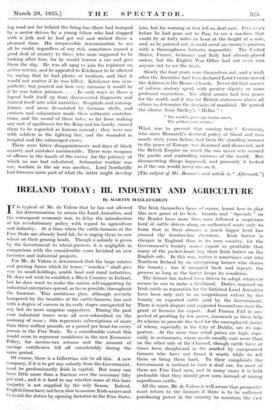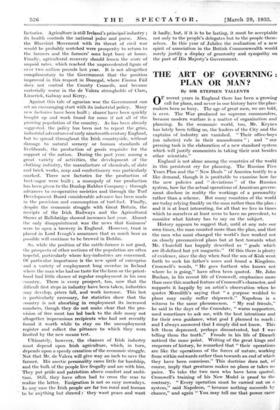IRELAND TODAY : III. INDUSTRY AND AGRICULTURE
By MARTIN MACLAUGHLIN
IT is typical of Mr. de Valera that he has not allowed his determination to retain the Land Annuities, and the consequent economic war, to delay the introduction of his revolutionary policy with regard to agriculture and industry. At a time when the cattle-farmers of the Free State are already hard hit, he is urging them to sow \wheat on their grazing lands. Though a subsidy is given by the Government to wheat-growers, it is negligible in comparison with the considerable sums lavished on new factories and industrial projects.
For Mr. de Valera is determined that the large estates and grazing, farms which he terms " ranches " shall give way to small-holdings, arable land and rural industries. He does not wish to establish a Black Country in Ireland, but he does want to make the nation self-supporting by industrial enterprises spread, as far as possible, throughout the Saorstat. This ambitious plan, although severely hampered by the troubles of the cattle-farmers, has met with a degree of success in its early stages unexpected by any but its most sanguine supporters. During the past year industrial issues were all over-subscribed on the morning of issue ; this represents subscriptions of more than three million pounds, or a pound per head for every person in the Free State. To a considerable extent this would seem to represent confidence in the new Economic Policy, for income-tax returns and the amount of savings certificates fell off considerably during the same period.
Of course, there is a Gilbertian side to all this. A new company, if it is to get any subsidy from the Government, must be. predominantly Irish in capital. But many can have little more than a fraction over the necessary fifty per cent., and it is hard to say whether some of this bare majority. is not supplied by the wily Saxon. Indeed, English firms have not been slow to assume. Irish names and to avoid the duties by opening factories in the Free State. The Irish themselves have, of course, learnt how to play this new game at its best. Guards and " Specials " on the Border have more than once followed a suspicious herd of cattle driven along an authorized route only to learn that in their absence a much bigger herd has crossed the frontier-line elsewhere. Irish butter is cheaper in England than in its own country, for the Government's bounty makes export so profitable that many of the packet-boats buy their Irish butter on the English side. In this way, butter is sometimes sent into Northern Ireland by an enterprising farmer who claims the bounty ; has it smuggled back and repeats the process as long as the butter keeps its condition.
The farmer has indeed been driven to adopt whatever means he can to make a livelihood. Duties imposed on Irish cattle as reparation for the forfeited Land Annuities have been only met to an insignificant extent by the bounty on exported cattle paid' by the Government. There is much dispute and supposed favouritism over the grant of licences for export. And Fianna Fail is sus- pected of profiting by low prices, inasmuch as these help its scheme to provide free beef for the unemployed, many of whom, especially in the City of Dublin, are its sup- porters. At the same time retail prices are high, espe- cially in restaurants, where meals usually cost more than on the other side of the Channel, though cattle have at times . been slaughtered in the market by exasperated farmers who have not found it worth while to sell them or bring them back. To their complaints the Government is inclined to turn a deaf ear, for most of them are Fine Gael men, and in many cases it is held preferable that they should grow corn instead of raising superfluous cattle.
All the same, Mr. de Valera is well aware that prosperity must return to the farmers if there is to be sufficient purchasing -power in the country- to maintain the rew factories: Agriculture is still Ireland's principal industry ; its health controls the national pulse and purse. Also, the Blueshirt Movement with its threat of civil war would be probably scotched were prosperity to return. to the farmers and the farmers' sons kept busy at home.
Finally, agricultural recovery should lessen the score of unpaid rates, . which reached the unprecedented figure of •• over two million pounds last year. It is not altogether complimentary to the Government that the position improved in this respect in Donegal, where Fianna Fail • does not control the County Councils, and became materially worse in the de Valera strongholds of Clare, .Limerick, Galway and Kerry. • . Against this tale of agrarian woe the Government can set an encouraging start with its industrial policy. Many - new factories have. been built ; ; shares have been quickly bought up and work found for some if not all of the growing population of the country. As has been already suggested, the policy has been not to repeat the grim, industrial adventures of early nineteenth-century England, but to spread throughout the Irish countryside, without damage to natural scenery or • human standards of livelihoods, the production of goods requisite for the support of the nation. During the past year, among a great . variety of activities, the development of the clothing industry, the manufacture of chemicals, of slate and brick works, soap and confectionery was particularly • marked. Three new factories for the production of beet-sugar were built ; a monopoly of tire production has been given to the Dunlop Rubber Company ; through advances to co-operative societies and through the Turf Development Board considerable advance has been made in the provision and consumption of turf-fuel. Finally, - despite the economic struggle with Great Britain, the.
receipts of the Irish Railways and the Agricultural Shows at Ballsbridge showed increases last year. Almost • t he only disappointment was the news that Guinness' were to open a brewery in England. .However, trust is placed in Lord Iveagh's assurance that as much beer as possible will continue to be brewed in Dublin..
• So, while the position of the cattle-farmer is not good, - the prospects of other sections of the population are often hopeful, particularly where key-industries are concerned.
• • Of particular importance is the new spirit of enterprise • and a variety of employment- long overdue in Ireland where the man who had no taste- for the farm or the priest- hood had little chance of regular employment in his own country. There is -every prospect, too, now that the difficult first steps in industry have been taken, industries may develop; prices fall, and work increase. This last is particularly necessary, for statistics show that the country is not absorbing in employment its increased numbers, though they do not make clear that the pro- - vision of free meat has led back to the dole many not altogether impecunious recipients. who had not recently - found it worth while to stay on the unemployment • register and collect the pittance to which they were -limited by the new means test.
Ultimately, however, the chances of Irish industry must depend upon Irish • agriculture, which, in turn, dependS upon a speedy cessation of the economic struggle. Not that Mr. de Valera will- give way an inch to save the farmer. His ascetic personality cares little for hardship, and the bulk of the people live frugally and arc with him. They put pride and patriotiSm abOVe comfort and 'ambi- tion. Still, they have often had to- cross the seas to realize the latter. Emigration is not so easy nowadays. In any case the Irish people are far too rural and human to be anything but shrewd they want peace and want it badly, but, if it is to be lasting, it must be acceptable not only to the people's delegates but to the people them- selves. In this year of Jubilee the realization: of a new spirit of .association in the British Commonwealth would surely justify a display_ of generosity and sympathy on the part of His Majesty's Government.







































 Previous page
Previous page